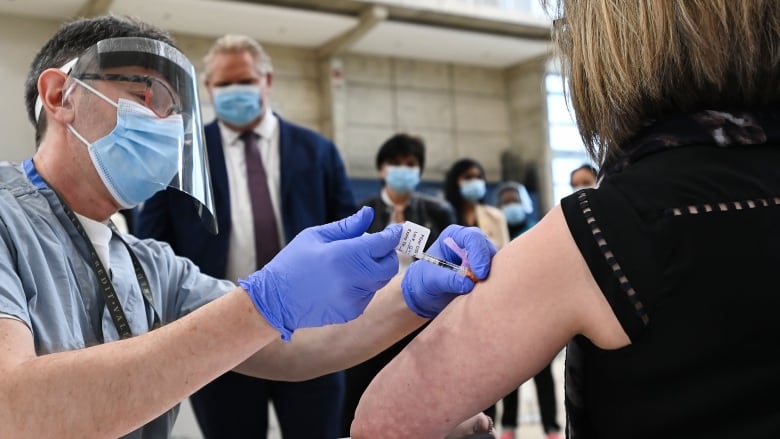Canadians' hesitancy about COVID-19 vaccine dropping, new poll suggests
Most survey respondents also less concerned about contracting the virus

A new survey conducted by the Angus Reid Institute suggests Canadians are more willing to get a COVID-19 vaccine immediately rather than take a "wait-and-see" approach.
Those who responded to the poll also said they were less concerned about contracting COVID-19 than they were in the fall and earlier this winter, hinting at a spark of optimism about the pandemic.
Shachi Kurl, president of the Angus Reid Institute, said the results offer both comfort and concern for public health officials, especially in places like B.C. where the daily number of COVID-19 cases has been rising in the past two weeks.
"I think people are perhaps indicating that their guard is a little bit lower than it was even two months ago," Kurl said. "And that's something that public health officials are really going to have to grapple with."
Lower vaccine hesitancy
The online survey was conducted between March 1 and March 4, among a representative randomized sample of 1,748 Canadian adults who are members of the Angus Reid Forum. For comparison purposes, a probability sample of this size would carry a margin of error of +/- 2.3 percentage points, 19 times out of 20.
Specifically, 66 per cent of respondents said they would get a vaccine as soon as possible, opposed to a low of 39 per cent who gave the same answer in September.
And only 16 per cent said they would wait to get the vaccine, compared to a high of 38 per cent in September.
The number of respondents who said they would not get the vaccine at all remained relatively steady at 12 per cent, compared to 14 per cent in July.
Concerns dropping
As for worries about contracting the virus, 62 per cent of respondents cited varying degrees of concern — a drop of nine per cent compared to January but still relatively high compared to last February, at 30 per cent, and even June at 46 per cent.
The survey suggests Canadians are more concerned about friends or family contracting COVID-19 — 79 per cent said they had varying degrees of concern, compared to less than 10 per cent who said they weren't concerned at all.

But while the number of respondents who are willing to get the vaccine sooner grows, the poll suggests more people are critical of the government's actions to secure and distribute it.
More than half of survey respondents said "Canada has done a poor job in securing sufficient doses for Canadians," compared to only 23 per cent who gave the same response in December.
However, just over half of the respondents also agreed that the amount of time they expect to wait for a vaccine is "not ideal but OK given the circumstances."
Dropping confidence in government
Asked how confident they were in the federal government's ability to effectively manage vaccine distribution, 54 per cent of respondents said they weren't confident, compared to only 36 per cent in December.
On a related topic, there was a steady decline of Canadians who said the federal government had done a good job handling the pandemic over time — 48 per cent, opposed to a high of 70 per cent in April. Confidence in Prime Minister Justin Trudeau's handling of the pandemic has similarly declined.

In B.C., confidence in Premier John Horgan's handling is stronger — 66 per cent said Horgan has done a good job, compared to only 44 per cent of Canadians saying the same of Trudeau.
Provincial Health Officer Dr. Bonnie Henry's approval rating among British Columbian respondents was even better. While it has declined from a high of 89 per cent last April, it still sits at 76 per cent as of this month.
Rollout fair, says majority in B.C.
However, Kurl warns those approval ratings can be highly variable.
"Approval numbers around these types of questions or metrics are really only as good or as bad as your performance in the recent past," she said.
The majority of respondents in B.C., 63 per cent, also said they watch provincial or federal health media briefings from chief medical officers as their top choice for information about the virus.
Most of them also agreed that the vaccine rollout is fair, a good plan overall, and clear and easy to understand. The majority, 53 per cent, also said they believe it had been well thought out.
However, only 42 per cent said they believe the vaccine rollout will meet its targets and timelines.
CBC British Columbia is hosting a town hall on March 10 to put your COVID-19 vaccine questions to expert guests, including Provincial Health Officer Dr. Bonnie Henry. You can find the details at cbc.ca/ourshot. Have a question about the vaccine, or the rollout plan in B.C.? Email us: bcasks@cbc.ca

